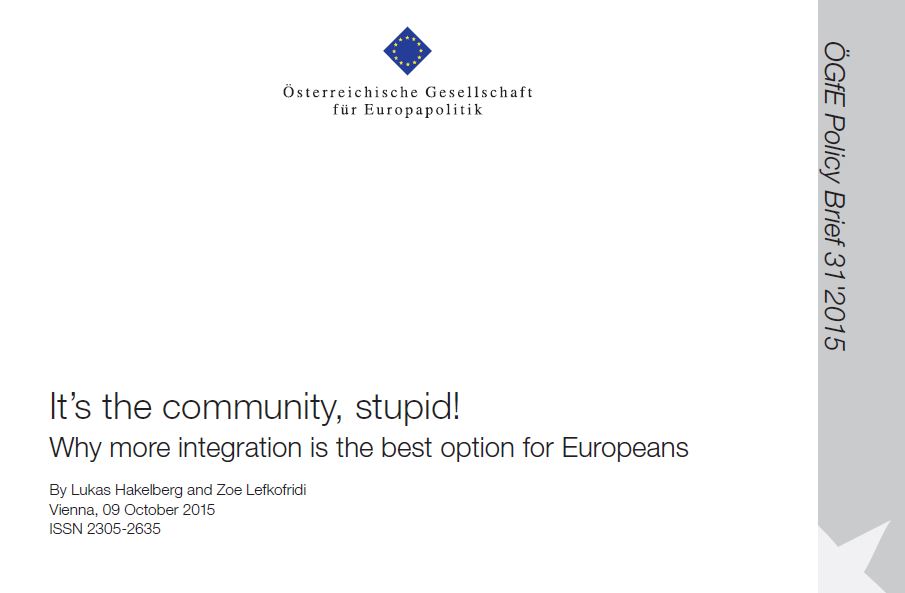Why more integration is the best option for Europeans
Policy Recommendations
- The Community method should become the norm in EU decision-making.
- A European Chamber debating, amending and voting on Eurogroup conclusions should be established to enhance parliamentary control.
- National parties must forge trans-national links in order to replace antagonisms between member states by competition between supranational parties.
Abstract
More integration is not only the optimal path for resolving the recent crises of the Eurozone and the accommodation of refugees but also the best response to the challenges posed by globalization: faced with the ascent of emerging economies, only if united can the EU remain an influential player in global affairs and effectively defend Europeans’ interests. EU leaders should thus discard nationalistic discourse, exits or reverse gears; instead, they must enhance unity and empower European citizens. For this purpose, pro-EU party elites must implement a number of institutional reforms. In this regard, public opinion is less of a constraint than typically portrayed due to citizens’ identification with Europe; the real change of attitude, however, needs to occur at the level of party elites: instead of succumbing to the temptation of blame-games, they should transfer their own organizations’ “loyalty” to the community. They must cooperate more closely to provide common visions and raise European solutions to problems and issues concerning all Europeans (e.g. TTIP, migration, consumer protection, labor rights) in political debates and electoral programs – in both national and European elections. As greater power generates greater expectations and responsibility, Germany, the major beneficiary of integration, should take the lead in showing greater solidarity.
****************************
It’s the community, stupid!
Why more integration is the best option for Europeans
The Eurozone crisis and the refugee inflow recently revealed the inter-relationship between European Union (EU) and domestic policy to mass publics. Yet, some insist in treating them as somebody else’s problem: critics advocating for a partial rollback of European integration received little opposition from traditionally pro-EU party elites; scared of losing votes to nationalists-populists-Eurosceptics, they, too, retreated to state-centric calculations of interest and increasingly chauvinistic discourse[1]. Pro-EU parties in government thus tied their own hands and pursued sub-optimal paths, instead of taking bolder steps towards political integration.
In contrast, we argue that more integration is the only optimal path for resolving crises and responding to challenges posed by globalization. Policymakers should therefore discard nationalistic discourse involving exits or reverse gears for good. Instead, they must forge unity and ensure that European citizens – the actual sovereign also at EU level – have a say in European politics. In view of this, traditional party elites must implement a number of institutional reforms, and, transfer their own organizations’ “loyalty” to the community.
L’ union fait la force
Now that governments are renegotiating the rules of the world economy, European unity is more crucial than ever. Inter alia, they are about to determine whether environmental regulation is an objectionable non-tariff barrier to trade, tax avoidance a legitimate business strategy, and arbitration a means for foreign investors to challenge public policy. Owing to the ascent of emerging economies, even the largest EU members are losing sway, whereas the EU as a whole has the potential to remain an influential player in such global negotiations[2]. Its decisive power resource is the single market, the world’s largest consumer market for some time to come. It contributes such an enormous chunk to the revenues of multinational corporations that hardly any of them would leave voluntarily. They will therefore always (if grudgingly) comply with EU rules, if access to the single market is compliance-dependent.
[zitat inhalt=”The EU disposes of enough market power and regulatory capacity to leave a distinctly European mark on international tax law, and the rules for global finance.”]
On this basis, the EU already enforces a wide range of environmental, consumer protection, and anti-trust regulation vis-à-vis foreign corporations, thereby removing competitive advantages vis-à-vis European producers that may arise from more lenient regulation in their home countries. In view of this, it also exports many of its products and regulatory standards to international organizations and other governments.[3] What is more, the EU disposes of enough market power and regulatory capacity to leave a distinctly European mark on international tax law, and the rules for global finance. It could, for instance, fight corporate tax evasion with an EU-wide diverted profits tax, or introduce a financial transactions tax without risking divestment – its share in global demand for goods and capital being simply too big.[4] To further reduce this risk, the EU could moreover condition market access of foreign corporations on the introduction of similar measures by their respective home governments, a strategy the United States applies in financial regulation.[5] To date, the EU’s failure to translate its potential into actual influence on global rules regarding tax and financial matters is mostly due to persistent disunity among member states, and the absence of a common vision of what a European approach would involve.[6]
The EU’s failure to translate its potential into actual influence on global rules regarding tax and financial matters is mostly due to persistent disunity among member states, and the absence of a common vision of what a European approach would involve.
Against this background, policymakers interested in defending the interest of European citizens at the global level need to do two things. They need to forge greater unity, and enable citizens to actually determine the EU’s political tack. That is, to provide common visions in policy fields where these are currently absent. Greater unity can only emerge, if approaches involving exits or reverse gears are filed away for good. This is because a perceived exit or reversal option in one policy field may also put necessary cooperation in others into question. In the UK, for instance, the proponents of Brexit were also the biggest fans of Grexit,[7] as they expected a boost for their own cause. Currently, the UK government uses the exit threat to wrestle important concessions from EU partners, inter alia, concerning the impact of EU regulation on the City of London.[8] A reversal of monetary union or a member’s exit from the EU may trigger “spill-backs”[9], thus grievously undermining the EU’s capacity to impact global rule-making to the benefit of Europeans.
Power to the Citizens
Instead of seeking refuge in shortsighted renationalization, Heads of State and Government should implement reforms discussed below that subject common policies to the systematic scrutiny of EU citizens. The latter must be able to hold European leaders accountable for their decisions, and – through their representatives – impact policy content already during negotiations at EU level. The crisis response has obviously fallen short of this ideal. Most visibly in Greece, the EU made important inroads into national prerogatives in fiscal, and social policy. The underlying agreements were, however, reached without the participation of the European Parliament (EP). Likewise, EU leaders established the European Stability Mechanism, and the Fiscal Compact by international treaty, outside traditional EU decision-making processes[10]. Hence, they created an institution raising capital for financial assistance to Eurozone members, and a regime obliging members to transpose the Stability and Growth Pact’s deficit targets into national law – that severely constrain the budgetary prerogatives of national parliaments. Still, they did not provide for parliamentary control to correct the ensuing democratic deficit, as national parliaments could not amend, but only ratify or reject these treaties.
All decisions should be taken according to the community method.
In view of reinstating popular sovereignty over core state powers, and fighting citizens’ frustration about their weak voice in European politics, several reforms are required. In principle, all decisions should be taken according to the community method. That is, the Commission initiates, and the Council and EP debate, amend, and vote on these initiatives. To give citizens greater sway in this process, however, electing the Commission president (among Spitzenkandidaten like in 2014) and confirming Commissioners through the EP is not enough. The Commissioner for Economic and Financial Affairs should additionally chair the Eurogroup instead of the current president, who is selected by finance ministers only. Moreover, a European chamber[11] debating, amending, and voting on Eurogroup conclusions should be established so that parliamentarians can be involved in crafting agreements, rescue packages, and new institutions before they are finalized. This would not just enable them to exercise their budgetary prerogative, but also encourage the formation of alliances based on political rather than national affiliations. In any case, these reforms are a means for establishing a more direct link between parliamentary elections and the political track of decision-making at EU level, especially in the Eurogroup.
Parties must raise European solutions to problems and issues concerning all Europeans (e.g. TTIP, migration, consumer protection, labor rights) in political debates and electoral programs.
All this presupposes that member states’ party organizations make a genuine effort in meeting the challenges of a multilevel polity. Although parties’ reelection is dependent upon national electorates, in the EU-28 polity, no single party can unilaterally affect any policy outcome, irrespective of the size and power of the member state. Hence, parties must raise European solutions to problems and issues concerning all Europeans (e.g. TTIP, migration, consumer protection, labor rights) in political debates and electoral programs. For an effective pursuit of policy goals – and, consequently also citizen representation – parties must forge trans-national links so as to promote their goals through a common front at the EU level[12]. As a result, antagonisms between member states could gradually be replaced by competition between supranational parties (groups of likeminded national parties). Hence, pro-EU party elites – who had deliberately kept the EU at their organizational periphery and outside electoral politics – should now transfer their organizations’ “loyalty” to the community. They can either integrate citizens better into EU decision-making and promote political integration, or watch Eurosceptic parties undermine popular support for the EU. The latter option would pave the way for the EU’s decline into global irrelevance, and ultimately the return to the nationalism and chauvinism the EU was built to cure.
Beyond greed and grievance: pursuing the common European good
Crucially, greater identification with Europe increases support for economic governance with redistributive features.
But do the proposed reforms have a chance of being implemented? Recent data suggest that a majority of EU citizens can be convinced of more integration to the common benefit. In 2013, 55 percent of EU citizens held at least a secondary European identity. That is, they identified with Europe and their home country.[13] In 2014, 67 percent of Eurobarometer respondents felt they were “EU citizens”, and 57 percent supported monetary union.[14] Crucially, greater identification with Europe increases support for economic governance with redistributive features. Among Eurozone citizens, a majority supports financial assistance to members in economic difficulty,[15] and even in Germany only 23 percent of respondents are fundamentally opposed to bailouts. The remaining 77 hold contingent views depending on the perceived economic burden for Germany, and credible reform efforts in recipient countries[16].
Hitherto, pro-EU parties have not done much convincing but succumbed instead to the temptation of blame-games. How could this trend be reversed? As power generates greater expectations and responsibility, Germany must take the lead in showing greater European solidarity.[17] Not only has the country benefited most from economic[18] and monetary[19] integration as well as from the Greek crisis,[20] but it also has both the economic might and the administrative capacity to promote European recovery. In France, it has moreover a partner that is more willing than ever to trade in national sovereignty for further political integration.[21] Hence, instead of “nationalistic moralizing” against the South’s (alleged) profligacy, the German government should apply more broadly the message it sent about the accommodation of refugees: “we are in a position to manage the development.”[22] This is, indeed, what the Bundesregierung needs to communicate to German voters, and EU partners alike: that Germany is strong enough and willing to invest in a brighter common future. Its suspension of the Dublin agreement for Syrian refugees, relieving periphery countries like Italy and Greece, could be a first step towards renewed European solidarity rooted in the insight that common problems need common solutions and a fair burden-sharing[23]. As Helmut Kohl put it 20 years ago, “the important challenges ahead of us demand our cooperation. They cannot, as suggested by old thinking oriented towards the nation-state, be solved by individual countries.”[24]
[1] Lefkofridi, Z., and Schmitter, P. C. 2015. Transcending or descending? European integration in times of crisis. European Political Science Review, 7(01), 3-22.
[2] Heinisch, R. 2015. “Auf dem Weg zu einem deutschen Europa? Eine internationale Perspektive.” In Liebert, U and Wolff, J. (eds). Interdisziplinäre Europastudien: eine Einführung. Springer Wiesbaden: 347-368.
[3] Young, A. R. 2015. The European Union as a Global Regulator? Context and Comparison, Journal of European Public Policy 22(9): 1233–52.
[4] For a discussion of how a broad tax base and establishment of the residence principle remove most possibilities for investor arbitrage, see: Schäfer, D. 2015. “Fiskalische und ökonomische Auswirkungen einer eingeschränkten Finanztransaktionssteuer”. Politikberatung Kompakt 95. Berlin: Deutsches Institut für Wirtschaftsforschung, https://www.diw-berlin.de/documents/publikationen/73/diw_01.c.499641.de/diwkompakt_2015-095.pdf.
[5] Oatley T. and Nabors, R. 1998. Redistributive Cooperation: Market Failure, Wealth Transfers, and the Basle Accord, International Organization 52(1): 35–54.
[6] Hakelberg, L. 2015. The power politics of international tax co-operation: Luxembourg, Austria and the automatic exchange of information. Journal of European Public Policy, 22(3), 409-428; Posner, E. and Véron, N. The EU and Financial Regulation: Power without Purpose?, Journal of European Public Policy 17(3).
[7] Independent. 2015. “Europe’s Future: The Greek Debt Crisis Is about Far More than One Country’s Fiscal Irresponsibility. An Entire Continent Is at Stake,” London: The Independent,, http://www.independent.co.uk/voices/editorials/europes-future-the-greek-debt-crisis-is-about-far-more-than-one-countrys-fiscal-irresponsibility-an-entire-continent-is-at-stake-10354223.html.
[8] Grant, C. 2015. “David Cameron Should Stand up to the Eurozone,” Financial Times, July 30, URL: http://www.ft.com/intl/cms/s/0/c8d9bf0c-3453-11e5-bdbb-35e55cbae175.html#axzz3iXZ495f6.
[9] A spill-back is when member states no longer wish to deal with a policy at the supranational level, see Lefkofridi and Schmitter, op. cit.
[11] This would consist of Eurozone countries’ deputies at the EP or national parliaments. See http://www.theguardian.com/commentisfree/2014/may/02/manifesto-europe-radical-financial-democratic and the petition organized by Piketty and others in 2014: http://www.pouruneunionpolitiquedeleuro.eu/en/#.Vd62RMdmaLO .
[12] Lefkofridi, Z. 2014 “National political parties and EU policy developments: the case of Greece prior to the crisis.” Journal of Modern Greek Studies 32.2: 287-311.
[13] Risse, T. 2014. “No Demos? Identities and Public Spheres in the Euro Crisis,” JCMS: Journal of Common Market Studies 52, no. 6: 1207–15,
[14] European Commission 2015. “Standard Eurobarometer 83: Public Opinion in the European Union”. Brussels: TNS Opinion & Social, URL: http://ec.europa.eu/public_opinion/archives/eb/eb83/eb83_first_en.pdf.
16] Bechtel, M. M. Hainmueller, J. and Margalit, Y. M. 2015. “Policy Design and Domestic Support for International Bailouts,” SSRN Scholarly Paper (Rochester, NY: Social Science Research Network), 34, URL: http://papers.ssrn.com/abstract=2163594.
[18] Schmitter, P. C. and Lefkofridi, Z. 2015. Neofunctionalism as a Theory of Disintegration. Paper presented at panel. “European Disintegration – A Blind Spot of Integration Theory?’ 22nd CES Conference, Paris July 8-
[20] Dany, G. Gropp, R. and von Schweinitz, G.2015. “Germany’s Benefit From the Greek Crisis,” IWH Online- Leibniz Institut für Wirtschaftsforschung Halle. URL: http://www.iwh-halle.de/d/publik/iwhonline/io_2015-07.pdf.
[21] URL: http://www.sueddeutsche.de/politik/emmanuel-macron-im-interview-wir-wollen-eine-neugruendung-europas-1.2628139
[22] Gammelin, C. 2015. Bundeshaushalt: Schäuble darf großzügig sein, sueddeutsche.de, August 27, URL: http://www.sueddeutsche.de/wirtschaft/kommentar-schaeuble-hat-recht-1.2622355.
[23] Euractiv 2015. Germany suspends Dublin agreement for Syrian refugees. 26.08.2015, URL: http://www.euractiv.com/sections/global-europe/germany-suspends-dublin-agreement-syrian-refugees-317065
[24] Konrad Adenauer Stiftung. 2015. Helmut Kohl – Europa, URL: http://www.helmut-kohl-kas.de/index.php?key=&menu_sel=15&menu_sel2=213&menu_sel3=117.
ISSN 2305-2635
The views expressed in this publication are those of the authors and not necessarily those of the Austrian Society of European Politics or the organisation for which the authors work.
Citation
Hakelberg, L., Lefkofridi, Z. (2015). It’s the community, stupid! Why more integration is the best option for Europeans. Vienna. ÖGfE PolicyBrief, 31’2015
Keywords
Democracy, Germany, Greece, Eurozone crisis, Political Integration, Reforms, Refugees, Solidarity.
Note
On the basis of this Policy Brief a German commentary has been published on the website of the daily “Der Standard”.








